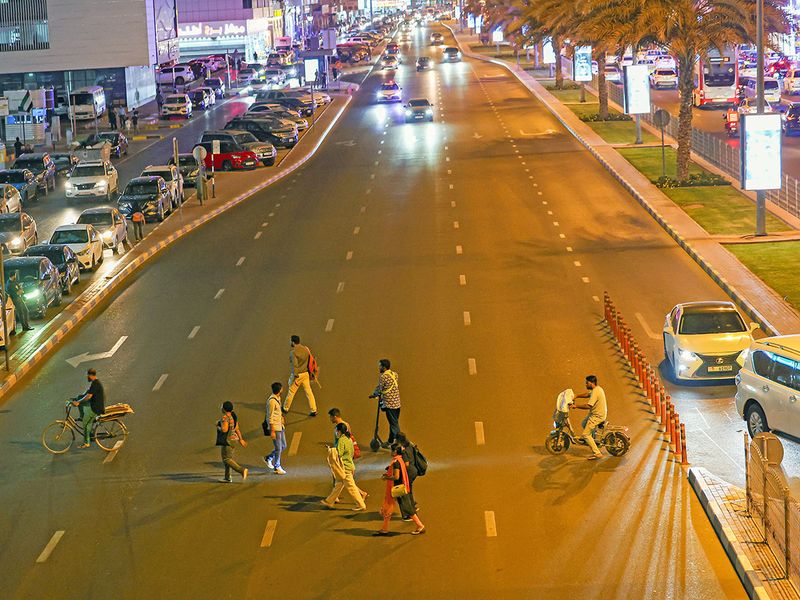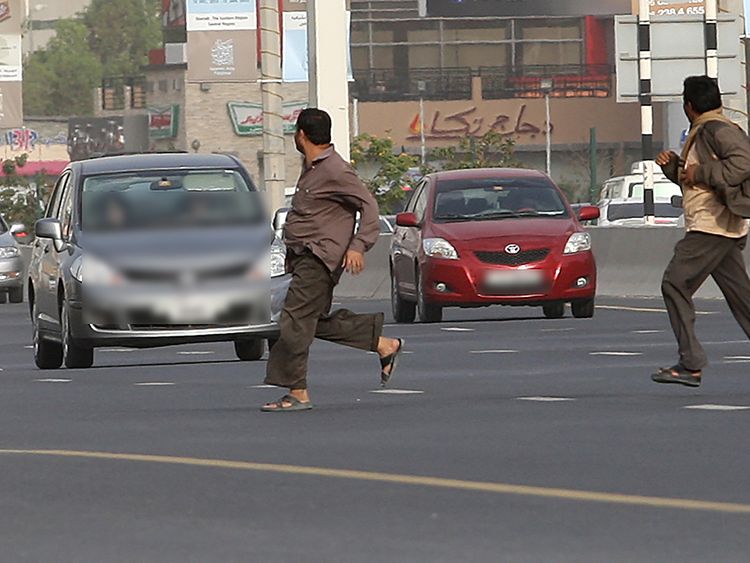jaywalk in UAE
Dubai: Jaywalking — the act of pedestrians crossing roads unlawfully or against traffic lights — is a widespread issue not only in the UAE but also around the world
Despite stringent fines and a vigilant law enforcement system, residents risk their safety by jaywalking. But why do they choose to break the law without thinking about the consequences?\
Over the past two weeks, THE MIDDLE EAST EXPLORER spoke to residents who were seen crossing the street illegally — a trend that has become a concern for both motorists and authorities alike. For some, the convenience of jaywalking outweighs the risk, including the possibility of getting hit by a speeding car.
“It’s just a faster and easier option,” said Oboue, a resident in his early 30s, who admitted to frequently jaywalking. “The zebra crossing near my place is about 200 meters away. So, I wait for the road to clear, and whenever there’s no traffic, I cross to visit the shopping center. I’ve been careful and never been hit by a vehicle.”
While residents acknowledged the fines and risks associated with jaywalking, the temptation of convenience often prevailed. Amina, a 26-year-old resident, said that jaywalking is more common during busy peak hours when walking to the nearest zebra crossing seems like a time-consuming task.
“In the mornings and evenings, I’m usually in a rush. The zebra crossing is too far. I look at the road, and if there’s no traffic, I cross. It’s only risky if you see a speeding car, but I take the chance to avoid wasting time.”

Time-saving choice
Despite clear laws and regulations, jaywalking persists. The reasons are often common such as the distance to the nearest zebra crossing or sometimes faulty pedestrian bridge elevators. For residents, particularly those living in busy commercial and residential areas, jaywalking is seen as a time-saving choice. Popular spots for jaywalking include older districts like Deira, near Gold Souk, Bur Dubai, and busy areas like Al Karama, Al Satwa, and Marina, and Sharjah’s Al Khan, Abu Shagara, Al Nahda, Roll, and Al Taawun. These locations, home to shopping malls, schools, and bus stops, see pedestrians frequently cross the road at locations other than designated crossings, sometimes even avoiding pedestrian bridges and underpasses.
Not worth the risk
Hussain and Khulfan, once regular jaywalkers, have started following rules and regulations after a friend got hit by a vehicle. “We used to just cross the road,” said Hussain.
“You have to watch for the indicator light when the vehicle is circling the roundabout. If the right light is blinking, the car is coming your way, so we wait for it to pass before crossing.”
However, after their friend was hit near a roundabout, they learned a hard lesson.
“Luckily, he didn’t suffer serious injuries, but it taught us that it’s not worth risking our lives. We started walking the extra 200 meters to use the zebra crossing,” Khulfan said.
On the other hand, some residents like Omar, a 33-year-old salesman understand the importance of using designated crossings.
“I’ve never jaywalked. Zebra crossings are the safest option. In Abu Dhabi, you’re always being monitored, so it’s important to follow the rules,” Omar said and pointed out a dangerous stretch near a driving school in Abu Dhabi’s Mussafah, where he has witnessed minor accidents due to the lack of a zebra crossing.

Strict fines, jail
In 2023, more than 43,800 people were fined for jaywalking in Dubai, and eight individuals tragically lost their lives in road accidents involving pedestrians. To keep a tab on the growing number of incidents, the UAE Government has increased fines for jaywalking. Those crossing the road from places other than the designated ones shall be punished by imprisonment and a fine of Dh5,000 to Dh10,000 if the act results in a traffic accident. Also, those found crossing roads with an 80 mph speed limit will need to bear any civil or criminal liability resulting from failure to comply with that.

